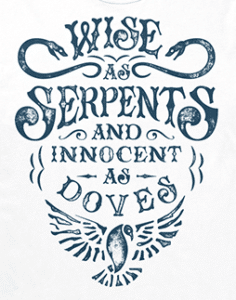 Fair Warning: this post explores some not-so-noble aspects of human nature and how you could (maybe even should) get them to work for you when planning your advertising strategy.
Fair Warning: this post explores some not-so-noble aspects of human nature and how you could (maybe even should) get them to work for you when planning your advertising strategy.
If you’re not comfortable with that, skip this post, OK?
So let’s start with two “givens” most of you already know:
- All real persuasion is actually self-persuasion, and hinges on Identity & Self Image
- Decisions are made emotionally, not logically
Now connect the dots:
The only emotions that reliably inspire action are those that affect self-image.
Joy is a wonderful emotion, but since it doesn’t touch on self-image, it won’t reliably inspire action. Happy, satisfied people don’t buy much.
So what actions do touch on self image? According to Aristotle, they are:
- Anger & Fear
- Patriotism
- Emulation
Fear comes from the threat of loss or damage, and Anger is basically a defense against ego threats. If you threaten a person’s identity, you’ll get fear and anger — emotions which can be channeled towards action aimed at defending against that threat. When one “adds insult to injury,” it’s the insult which provides the greater ego threat, and therefore provokes the retaliation.
Patriotism (AKA, Tribalism) acts on identity through group membership. People routinely buy things to proclaim their membership in this or that tribe. Or sacrifice to protect their family, tribe, country, etc.
Emulation (AKA, Aspiration) touches on what we wish we were and hope to become. One buys Air Jordan’s because one wants to “be like Mike.” Similarly, we use the products our gurus use in order to become more like them.
Obviously, tribalism and emulation can overlap quite a bit. One can certainly buy an Apple laptop as much to emulate the creative crowd that tends to prefer them, as to signal one’s own membership within the Apple tribe.
The Karmic Counter-Balanced for Honest Business People
 But how do you use this for small business advertising?
But how do you use this for small business advertising?
First, I think these things work best when used for premium (and premium priced) products and services.
Heck, I’d even venture to say that they’re a sort of a karmic counterbalance to the uphill battle most honest-goods, premium-priced business people face when it comes to human nature.
Trying to convince people to pay more now because it’ll pay off in the future is a hard sell.
That desire for immediate gratification is human nature too, and it works against the honest business man. The same thing can be said of our desire to compare things based on easily compared and quantifiable numbers (like price) rather than a nuanced appreciation for overall quality.
So let’s say you are the high quality and premium priced option in your market. How do you counter-balance those biases of human-nature that push prospects toward low priced options?
Is it enough simply to talk about your own high quality standards and product (or service) advantages?
Well, if you’re a fan of Ogilvy’s “Positively Good” theory of advertising, you might think so. And perhaps that option would be partially effective.
But taking that approach falls short if your ads aren’t fully engaging prospects’ self-image and evoking action-oriented emotions.
A straight claim of features and benefits frames the buying decision in terms of cost vs benefit instead of identity.
Leveraging the Power of Us vs. Them
 If you’re going to make a play for identity then you have to show that those product advantages are there because you, the owner, INSIST on them. And you insist on them because of the values you hold and the kind of person you are.
If you’re going to make a play for identity then you have to show that those product advantages are there because you, the owner, INSIST on them. And you insist on them because of the values you hold and the kind of person you are.
The other companies’ owners don’t insist on them because of the values they don’t hold and the kind of people they aren’t.
So while I understand that it’s not nice to urge business owners to take shots at the competition, the reality is that if you want to create limbic-level contrast between you and the low-priced competitors, this is the strategy to use.
Those competitors already have human nature working for them in the form of instant gratification and decision-making bias.
And they’re already busy claiming to be “just as good, but cheaper” (or 90% as good for half the price).
So either you’re going to let them successfully make that claim, or you’re going to counter their attempt to leverage human nature against you by tapping into the greater power of identity-based emotion.
Meaning that your best defense is to brand those competitors as morally tainted. “Those people don’t share our tribe’s values, and their product suffers for it.”
If moving from “they don’t make the same decisions I make, therefore they have a lesser character” seems like a bit of a stretch, don’t worry, humans are hardwired to think that way. Social scientists even have a name for it: the fundamental attribution error.
And when you do it right, not only will that cognitive bias allow you to play on identity, it will evoke the necessary emotions of tribalism/patriotism — are you like me, or are you like those other guys?
Simply divide the world into people like you, who identify with your values, and those who aren’t and don’t; Us vs. Them.
Increasing the Limbic Contrast
 Now here’s how to put this strategy on steroids (while also getting a bit closer to “the dark side of the force” that I warned you about): bring in Anger.
Now here’s how to put this strategy on steroids (while also getting a bit closer to “the dark side of the force” that I warned you about): bring in Anger.
See, it’s not enough to simply point out that the competition uses lower quality materials, cheaper manufacturing methods, and shoddy shortcuts. Hey, what’s wrong with having a lower priced option on the market, right?
You have to give motivation to those acts — motivation that would threaten the ego and identity of the customer.
In other words, you have to provide the insult to the potential injury that your competition would inflict on the unsuspecting buyer. That is, you have to provoke anger.
Those competitors aren’t doing those things to lower costs. They’re doing them to screw you, the customer, over. And they’re laughing about it all the way to the bank.
They know that their product or service is less likely to give you, the customer, the end benefit you want — the benefit you are rightfully paying for. They know that their product or service might fail you in the worst possible way. And they don’t care. Because if you’re stupid enough to be fooled by them, then (as they see it) you’re their rightful prey.
So do you want to take a chance with those assholes who are laughing at you behind your back? Or do you want to invest in the sure thing, provided by people who believe what you believe, and who genuinely care about doing right by you?
See how that works?
A Word About Ethics
 Obviously you ought not to demonize an honest business who is simply aiming to sell at a lower price point than you.
Obviously you ought not to demonize an honest business who is simply aiming to sell at a lower price point than you.
Not only is that wrong, it’s bound to backfire in relatively short order.
But if your competition really is selling an inferior product, cutting corners, and engaging in false advertising — and relying on some of the downsides of human nature to get away with it — then this is the best way to:
- Level the playing field,
- Call them out on their shenanigans, and
- Stomp their low-priced butts into the ground.
Just remember: with great power comes great responsibility.
And harnessing peoples’ anger, tribalism, and emulation — their emotions of Us vs. Them — provides a great deal of persuasive power.
- Are You Paying for Too Much for the Wrong Keywords? - July 15, 2024
- Dominate Your Market Like Rolex — 4 Powerful Branding Lessons - July 3, 2024
- Military-Grade Persuasion for Your Branding - June 25, 2024
